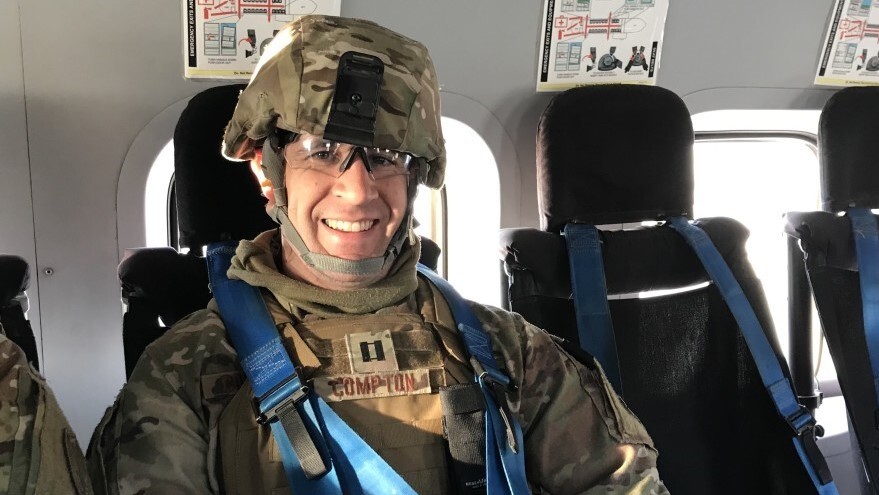
Note: Jacob Hagstrom, Ph.D., interviewed in this article, is a professor with The Citadel’s Department of History. Hagstrom, a graduate of the United States Military Academy West Point, joined The Citadel in 2020 and teaches Leadership in Military History and History of the U.S. Military.
As heard on South Carolina Public Radio, by Victoria Hansen
Excitement mixes with exhaustion as Major Phil Compton wraps up a mission in New Jersey. The operations flight commander with the 628th Civil Engineer Squadron at Joint Base Charleston has been busy, very busy.
“It’s a personal mission to go to Afghanistan and do what we do,” says Maj. Compton. “A lot of us embrace that.”
A Mission of Hope – A Serviceman’s Story
Compton was deployed in 2011 he says to teach Afghans in Kabul how to build a sustainable model for their bases. He returned in 2018 as part of the Afghanistan-Pakistan Hands program learning valuable cultural and language skills to bridge the efforts between the military and Afghans.
That’s when he worked closely with interpreter Zamzama Safi.
“When I met her, it was very clear she had gone through some trauma,” says Maj. Compton.
Safi was kidnapped for three days, tortured and raped by the Taliban when she was 15 years-old. Compton and his colleagues feared for her life when Kabul fell to the Taliban in August shortly after U.S. forces pulled out. He was one of the first she contacted after safely evacuating.
“In my heart and mind, she represents like the resiliency of most Afghans that I’ve worked with,” says Maj. Compton.
“They can go through some tremendous trauma and turn around and smile at you and hope for a better future.”
Compton sees that same hope on the faces of Afghan refugees arriving in New Jersey.
The 35-year-old grandson of Mexican immigrants tells them in Dari, “Day by Day a new life will be made.”
As Compton focuses on hope, many Americans struggle to understand the 20-year war in Afghanistan. What did it accomplish if the Taliban could quickly regain control, and at what cost?
Nearly 2,500 American service members and 4,000 U.S. contractors were killed. The monetary price tag is estimated at more than $2.3 trillion.
Another Mistake – A Veteran’s View
“All those years of money and sacrifice by the American people were literally in vain,” says Gerald Mahle of Beaufort.
The 77-year-old was deployed in 2002 as a civil affairs Sergeant in the Army.
“If you want to explain Afghanistan, just look at Vietnam,” says Mahle. “It’s just a mirror image. We did the exact things wrong 30 years later.”
Mahle believes the U.S. should have left when Osama Bin Laden was killed, arguing what he saw of Afghanistan wasn’t really a country, but fragmented tribes in conflict with one another. He says America has no business imposing its values on others.
“Who are we to tell them they need to have Democracy,” he says. “They were fighting and killing each other for the last thousand years.”
“I think everyone has an individual story to tell and it’s based on these local things that aren’t necessarily replicated elsewhere,” says Citadel professor Dr. Jacob Hagstrom.
Hagstrom was deployed too, in 2011 as an Army field artillery officer with the 25th Infantry Division.
He’s learning much of politics is local as he pieces together the stories of other veterans and former leaders in Afghanistan as part of an oral history project.
What Can We Learn – A Professor’s Project
Dr. Hagstrom says Americans there after 2014 were likely aware deals were being made between the Taliban and Afghan elders, but they weren’t privy to those agreements.
That’s why, he says partnership are critical. They help overcome barriers in language, culture and history.
“If people in the United States had understood the history of Afghanistan from the beginning, I think we would have been a lot more wary about committing to a long-term military engagement there.”
For us, the mission to find those responsible for September 11th and prevent future terrorist attacks was the beginning of a 20-year war. But for Afghanistan, it was another battle in an ongoing, generational, civil war.

 Citadel study abroad trip brings WWII history to life
Citadel study abroad trip brings WWII history to life The Citadel thrives in intelligence studies, becomes first to embrace new federal strategy
The Citadel thrives in intelligence studies, becomes first to embrace new federal strategy South Carolina Supreme Court to hear arguments on The Citadel’s campus
South Carolina Supreme Court to hear arguments on The Citadel’s campus

